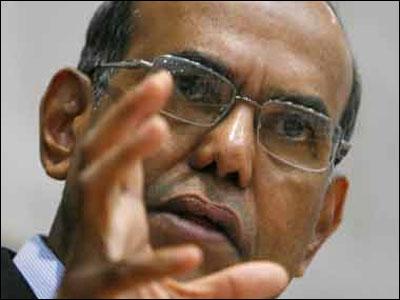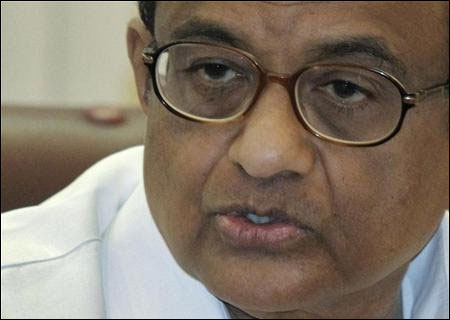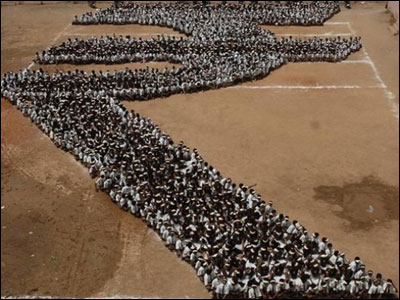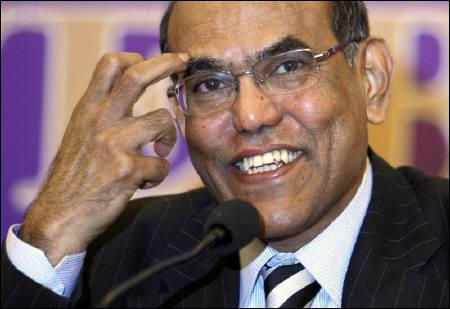 | « Back to article | Print this article |
No difference between RBI and finance ministry: Subbarao
Reserve Bank of India Governor Duvvuri Subbarao says the finance ministry and the central bank have shared goals and concerns. In an interview with Manojit Saha, he says the fiscal road map announced on Monday is a good basis for the conduct of the monetary policy. Excerpts:
Is there a disconnect between the finance ministry and the central bank over interest rates?
There is no disconnect. The government and RBI have shared goals and concerns. Both want high and stable growth, and low and stable inflation.
And, we have our respective responsibilities. It is a question of timing. I think the government understands our concerns.
We understand the government's compulsions. Sometimes, the coordination is more visible, sometimes it isn't. There will always be disagreements on certain issues but we need to settle those internally.
Click on NEXT for more...
No difference between RBI and finance ministry: Subbarao
Do you think the finance ministry's fiscal road map announced yesterday is credible?
It's certainly reassuring that the finance minister has indicated the fiscal trajectory not only for 2012-13 but also for the medium term.
He laid focus on expenditure compression, and expects to realise telecom revenues and disinvestment proceeds in full.
Of course, there is a lot of detail into it. We all know and understand how difficult it is to cut expenditure, especially in the short term.
There is also concern on tax revenues - whether these would be realised according to the Budget estimate.
But the finance minister has better information than all of us; we need to go by what he says. So, I would say it is a good basis for the conduct of monetary policy.
Click on NEXT for more...
No difference between RBI and finance ministry: Subbarao
RBI expects inflation to fall from the fourth quarter. What gives it this comfort?
First, if global commodity prices soften and if the rupee appreciates, we would get some comfort. There is an output gap now. If there is a supply response, that would also reduce pressure on inflation. Also, there is a base effect.
So, with the factors from the real world and the statistical world, we expect inflation to soften in the fourth quarter, though it is difficult to say precisely when.
Are you suggesting a rate reduction in January?
Noting is certain. On October 30, I cannot say whether I would go for a rate cut on January 29. If that was possible, I would have done it today (Tuesday).
We expect there is scope for further easing in the fourth quarter, based on our current assessment of growth and inflation trajectories.
Click on NEXT for more...
No difference between RBI and finance ministry: Subbarao
The liquidity tightness in the second half of October was enhanced by temporary factors like demand for currency in the festive season and lower government spending. However, CRR (cash reserve ratio) is a long-term tool. Why did you opt for CRR cut to address the liquidity issue resulting from temporary factors?
This is because we believe liquidity constraints would persist for the next few months. And, that is not temporary enough.
Yes, there is festival demand and there are government balances building up but there are also structural factors like the wedge between credit and deposit growth.
This wedge would persist a little longer. Our intention in reducing CRR today was to keep liquidity comfortable to ensure flow of credit at the current interest rate regime.
Click on NEXT for more...
No difference between RBI and finance ministry: Subbarao
Would open market operations (OMOs) continue even after the CRR cut?
I cannot say that at this point. OMOs have been on the table and these remain on the table. If we think liquidity is tight due to temporary reasons, we might resort to OMOs. We expect the easing we have done today to see us through the liquidity management.
Are you happy with monetary transmission - the way banks responded to earlier CRR cuts?
I cannot say whether I am happy or not. We would like transmission to take place. Some transmission has taken place.
After the 25-basis point CRR cut in September, there was a 13-basis point reduction in lending rates. We would like further transmission to take place.
Click on NEXT for more...
No difference between RBI and finance ministry: Subbarao
Do you expect further softening of lending rates after today's CRR cut?
Definitely.
You would complete a five-year term next September. What are the two things you would like to see by then.
I think we should be growing at seven per cent-plus next year. Inflation should come down. I would like to see at least these two parameters when I leave RBI.
So, are you saying seven per cent growth in 2013-14 is a possibility?
Of course. It is very much in the realm of possibility. But it would also depend on the global situation.






